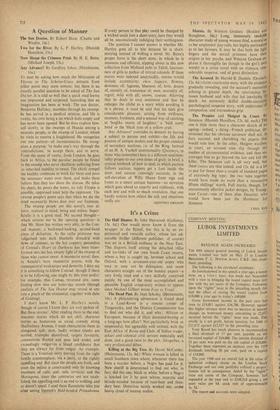A Question of Manner
Any Advance? By Geoffrey Johns. (Hutchinson, 16s.)
To start by asking how much the Miltonism of Thyrsis or The Scholar-Gipsy detracts from either poem may seem remote; but there is an exactly parallel question to be asked of The Sun Doctor. It is told so well that a quick read leaves one impressed and surprised, hazarding that an imagination has been at work. The sun doctor, Benjamin Halliday, stumbles through his swamp: he has served in a medical mission, and life is vanity, his own being a tin which feels empty and has never been opened. But he does explore him- self slowly, in the swamps of Manda among a neurotic people, in the swamp of London, which he visits to receive a knighthood. He recognises our one pattern—of inconsistencies. He recog- nises a purpose, 'to make one's way through the contradictions,' to accept them, and to serve. From the sense of vanity, from London, he goes hack to Africa, to the peculiar people he found in the swamp who serve chieftains suffering from an inherited inability to sweat. The chiefs compel the healthy commons to work for them and pour the necessary water over them, and make them believe that they too share the disease. He takes his share, he pours the water, no tidy Utopia is possible, oppressed must help the oppressor. The swamp people's poem says that when we die the wind necessarily blows dust over our footsteps.
The swamp people are this novel's tour de force, realised in mind, being and milieu. Super- ficially it is a good read. My second thought— which returns me to the opening question—is that Mr. Shaw has written very ably, in the Con- rad manner, a backward-looking, second-hand piece of defeatism. As the rathe primrose was vulgarised into dark bluebells drench'd with dews of summer, so the hot coppery penumbra of Conrad's Heart of Darkness has been trans- formed into the hot, sweaty light of the swamp of those who cannot sweat. A mannerist novel, then, as Arnold's were mannerist poems, with the consequential weaknesses and demerits. I dare say it is something to folloW Conrad; though if there is to be following, one might by this time prefer, for example, that Camus, reverend sire, came footing slow into our latter-day novels (though analysis of The Sun Doctor may reveal at any rate a pinch of the existential, together with dabs of Golding).
I don't know •Mr. L. P. Hartley's , novels, though of course I know they are well spoken of. But these stories! After reading them to the end, macabre stories which do not chill, character stories as humorous as social comedy along Shaftesbury Avenue, I must characterise them as elongated, soft, slow, badly written (ranks are serried, triumphs short-lived, targets favourite, conventions flouted and pens laid aside), and exceedingly vulgart in a bland confidence that they arc always far from vulgar. An example. There is a Venetian story moving from the right family commonplace, via a party, to the rightly appalling end. But since the people are froth, and since the milieu is constructed only by knowing murmurs of calle, pall, sala, terrazza, and the Maringona, since the contraries are not estab- lished, the appalling end is an end to nothing, and so doesn't appal. I read these flannelette tales just after seeing lonesco's Bald-headed Pritnadonna.
If every person in that play could be changed by a wicked uncle into a short story, here they would all be, unconsciously indulging their nothingness.
The question I cannot answer is whether Mr. Hartley goes all to bits because he is short- storying instead of writing a novel. Mr. Bates's proper form is the short story, in which he is sensuous and efficient, nipping about in this new collection from Midland pubs to Tahiti, luscious- ness of girls to pathos of retired colonels. If these stories were indexed analytically, entries would include eccentricity; Men fugaces; flowers, dewiness of; lagoons, blueness of; love, dream of, eternity of, transience of; man, mortality of; regret, wild with all; snows, roseate. Allowing that he deals in easy sentiment and that he enlarges the cliche to a story while avoiding it in a phrase. it must be said that his tales give considerable pleasure, arising from swiftness, neatness, freshness, and a sensual way of catching at 'hoglike snorts of laughter,' a 'bald nutty head' or the 'black eyes of a yellow crab.'
Any Advance? overrides its demerit by having a subject to pursue and exhibit—the life and passion of antique dealers and the proper conduct of secondary auctions, i.e. of the Ring. Instead of an H. A. Vachell sentimentality (Quinneys, to those who remember) here is a different sentimen- tality proper to our own times of grab; in brief, a cynical textbook of how to deal, in which auction follows auction, tappers get a foot inside the door, and success cunningly succeeds, in the self-elevation of Willy Shaun from rags and bones to a smart antique business—an elevation which goes ahead so smartly and ruthlessly, with such zest and with so much revelation, that one hardly notices how stilted the talk and situations






































 Previous page
Previous page